
WEDNESDAY, July 1, 2015 (HealthDay News) — Extracurricular sports may help children develop the discipline they need to succeed in the classroom, a new study suggests.
Kids’ attention span and level of self-control are linked to their participation in organized, after-school sports, the researchers said. They noted their findings could help school and public health officials develop improved strategies that would reach children at risk for obesity as well as those struggling in school.
“We worked with information provided by parents and teachers to compare kindergarteners’ activities with their classroom engagement as they grew up,” study leader Linda Pagani, of the University of Montreal and CHU Sainte-Justine Children’s Hospital, said in a university news release.
“By time they reached the fourth grade, kids who played structured sports were identifiably better at following instructions and remaining focused in the classroom,” Pagani said.
“There is something specific to the sporting environment — perhaps the unique sense of belonging to a team, to a special group with a common goal — that appears to help kids understand the importance of respecting the rules and honoring responsibilities,” she noted.
The study, published July 1 in the American Journal of Health Promotion, included information on nearly 2,700 children. The children were all born in Quebec between 1997 and 1998.
The children’s kindergarten teachers answered questionnaires about their student’s behavior. The kids’ parents were also interviewed about their home life. Four years later, the researchers re-surveyed the children’s parents and teachers.
“Our goal was to answer two questions: firstly, does participation in extracurricular activities in kindergarten predict fourth grade self-discipline and, secondly, do kindergarten self-discipline characteristics predict fourth-grade participation in sports?” Pagani said.
The answers to these questions would shed light on how engaged the kids were in the classroom. The researchers also hoped to get information on how aggressive, compulsive and emotionally distressed the children were.
After taking other factors into consideration, such as the kids’ level of physical fitness, thinking abilities, mother’s education and family communication at home, the researchers found children involved in sports when they were in kindergarten were likely to be involved in team sports at 10. These kids also had higher self-control scores by fourth-grade, the researchers found.
Kids who had better behavior in kindergarten were also more likely to be involved in sports four years later. Unstructured activities in kindergarten however had no effect children’s lives later on.
While the study found an association between playing team sports and success in the classroom, the researchers did not prove a cause-and-effect link.
Pagani said she hoped that policy makers consider these findings and improve access to parks and playgrounds, where children can engage in sporting activities.
More information
The Child Mind Institute provides more information on how to find a balance among afterschool activities.
Copyright © 2026 HealthDay. All rights reserved.

